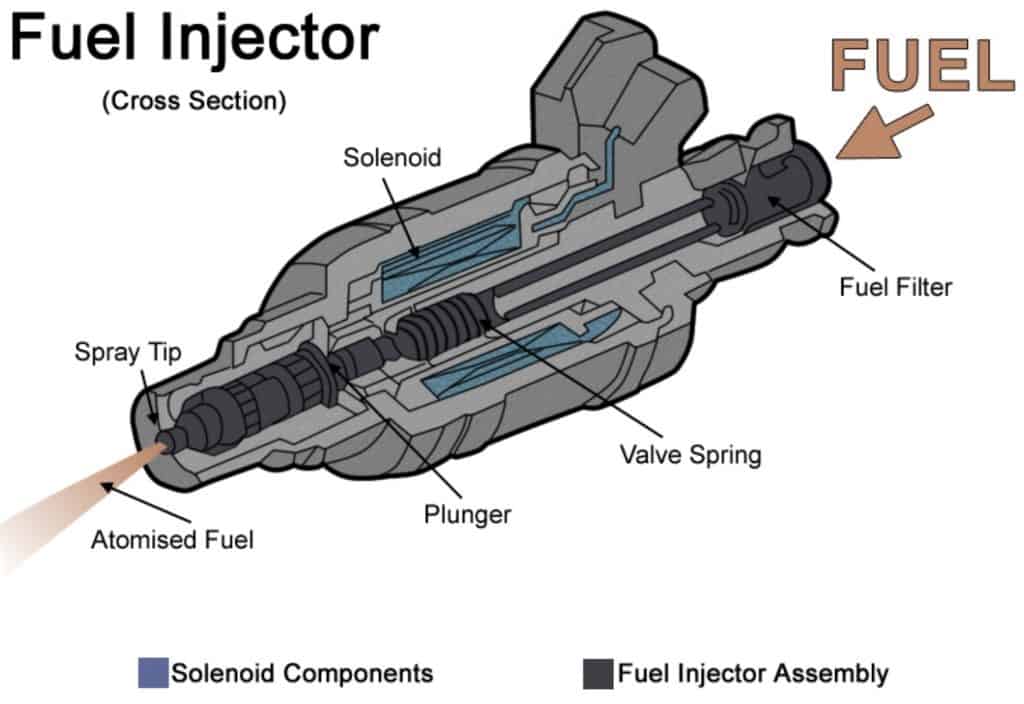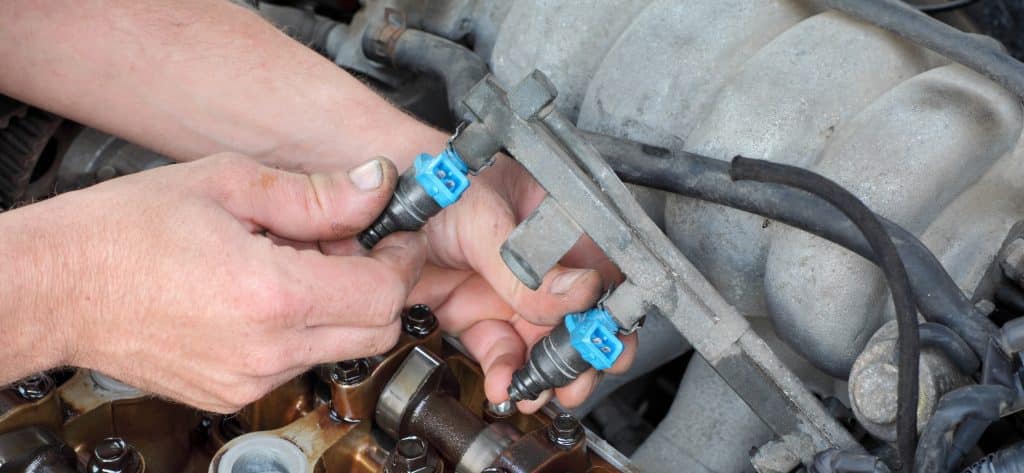
Fuel injectors can go the life of a modern vehicle with little to no trouble at all. That being said, bad fuel injectors are one of the more common issues that happen to any vehicle (Dodge Charger included).
There’s always more than one fuel injector, and even one going bad is enough to make a noticeable impact on the drivability of your car.
There are two main ways that your injectors can fail to do their job properly.
- The first is for them to become clogged, dirty, or unresponsive. When this happens, not enough fuel enters your Charger’s combustion chamber.
- The other way is if the injectors are leaking. When they leak, they can really cause some issues
When a fuel injector isn’t functioning properly, it can cause problems such as misfiring cylinders, the check engine light, or even a vibrating engine. In some cases, you may notice a bad fuel odor at idle or experience engine stalling.
Detecting these symptoms early and addressing the issue can prevent further damage to your engine and keep your Charger running smoothly.
Symptoms of Bad Fuel Injectors

1. Rough Idle
When your Dodge Charger has bad fuel injectors, you may notice a rough idle. This occurs because the injectors are not providing a consistent flow of fuel, causing the engine to operate unevenly.
With a fuel injector that is not properly atomizing fuel properly, your Charger is going to have a difficult time idling.
It’ll feel almost exactly the same as if it had a bad spark plug. That is to say; there will be a sudden drop in idle speed. It may feel like the engine is about to die as the PCM (powertrain control module) struggles to maintain idle speed.
2. Poor Fuel Economy
Your Charger’s PCM is constantly adjusting the air/fuel ratio and timing to get optimal combustion. When one or more of the fuel injectors aren’t functioning properly, the ratio will be off and fuel mileage suffers.
3. Misfires and Loss of Power
Bad fuel injectors can cause misfires in your engine due to an incorrect air-fuel ratio. This can lead to a loss in power and acceleration, making it difficult for your vehicle to perform at its best.
Typically, as the engine RPM increases, you won’t be able to “feel” the engine misfire as much. But, you’ll definitely notice the lack of power.
4. Difficulty Starting
If your fuel injectors are clogged or damaged, they may not provide the necessary fuel to start your car’s engine. This can make it more challenging to start your vehicle, especially if the problem persists.
5. Engine Stalling
A faulty fuel injector can cause your engine to stall, particularly when idling. In severe cases, this can prevent your engine from running altogether, leaving you stranded.
6. Poor Acceleration
Your Dodge Charger may experience poor acceleration if the fuel injectors are not providing the proper amount of fuel for combustion. This can result in sluggish performance and a lack of responsiveness when pressing the accelerator.
7. Unusual Exhaust Smell
A bad fuel injector can cause an unusual smell from your exhaust, as excess fuel or unburned fuel may be released through the exhaust system. This odor can be a sign of a damaged fuel injector that needs to be addressed.
Causes of Bad Fuel Injectors

Clogged Injectors
Clogged fuel injectors can lead to imprecise fuel distribution, subsequently affecting your Dodge Charger’s performance.
Debris, dust, or contaminants in the fuel can settle and accumulate in the injectors. This buildup can eventually restrict the flow of fuel, leading to a reduction in engine power and acceleration.
Leaking Injectors
A leaking fuel injector can cause an array of problems for your Dodge Charger. When the injector doesn’t close properly, excess fuel may enter the combustion chamber, creating a strong fuel odor and potentially wasting fuel.
Electrical Issues
Electrical issues with the fuel injectors can also hinder your Dodge Charger’s performance. Faulty wiring or damaged electrical components can cause the injector to send an incorrect signal to the engine control module (ECM), leading to a poor fuel-to-air ratio.
Looking for a damaged wiring harness is the first and easiest step to take if you suspect your Charger’s fuel injectors are failing.
Inaccurate signals to the fuel injectors can result in engine misfires, decreased power, and reduced fuel efficiency. Keeping an eye on your vehicle’s check engine light and addressing any potential electrical issues promptly can help maintain optimal performance.
Diagnosing Bad Fuel Injectors
Fuel Pressure Test
To diagnose bad fuel injectors in your Dodge Charger, start by performing a fuel pressure test. This test helps you determine if the issue is related to fuel injectors, a fuel pump, or a fuel filter.
Connect a fuel pressure gauge to the rail and check the pressure. If the pressure is within the specified range, you can rule out the fuel pump and filter as possible causes and focus on the injectors.
Visual Inspection
Another step in diagnosing bad fuel injectors is a visual inspection. Look for any signs of leakage or damage to the injectors.
Pay attention to any unusual odors, which could indicate leaking fuel. If you notice any problems with the injectors during the inspection, it’s likely that they need to be cleaned or replaced to resolve the issue.
On-Board Diagnostics

Finally, utilize your vehicle’s on-board diagnostics (OBD) system to identify any misfires or error codes related to the injectors.
If the Check Engine light is on, connect an OBD scanner to retrieve the codes. Misfire codes related to the affected cylinder will help you pinpoint which injector may be causing the problem.
By following these diagnostic steps, you can confidently determine if your Dodge Charger has bad fuel injectors and address the issue accordingly.
Conclusion
When dealing with a Dodge Charger, it is essential to be aware of the symptoms of bad fuel injectors. Some common symptoms include misfiring cylinders, a check engine warning light on your dashboard, a vibrating engine, and a bad fuel odor at idle.
These issues can lead to decreased performance and potentially more severe engine damage if left unaddressed.
It is crucial to diagnose the problem correctly, as many symptoms of bad fuel injectors can be similar to those of a failing fuel pump or clogged fuel filter. To do this, consider checking the fuel pressure at the rail before replacing the injectors, as this can help you determine the root cause of the problem and avoid unnecessary expenses.
If you notice dark gray smoke upon starting your Charger, unusually high oil levels, or a strong gasoline smell in the oil, these can also be indications of fuel injector issues. Stalling on idle is another potential sign of a bad fuel injector, which should not be ignored.
Frequently Asked Questions
How does a Dodge Charger behave when a fuel injector is going out?
When a fuel injector is going out in your Dodge Charger, you may experience symptoms such as rough cold starts, surging cold idle, poor throttle response, and stumbling during acceleration when cold. Additionally, your fuel economy may worsen, and you may notice diesel-level soot buildup. These symptoms can be similar to those of a bad fuel pump or fuel filter, so it’s important to check the fuel pressure at the rail before replacing injectors.
Will a malfunctioning fuel injector trigger a diagnostic code in a Dodge Charger?
Yes, a malfunctioning fuel injector can trigger a diagnostic code in your Dodge Charger. A misfiring cylinder and a check engine warning light on your dashboard are common signs of a bad fuel injector. If you suspect a faulty fuel injector, it’s wise to use a scanner that reads misfire data to confirm which cylinder is affected, and to avoid replacing components unnecessarily.
What occurs when a single fuel injector fails in a Dodge Charger?
When a single fuel injector fails in your Dodge Charger, the engine may misfire and cause a noticeable decrease in performance. This is because the affected cylinder is not receiving the appropriate amount of fuel, which can lead to issues such as vibration at idle, roughness in acceleration, and poor overall performance. If left unaddressed, a failed fuel injector can lead to damage in other parts of the engine. Replacing the faulty injector and ensuring the fuel system is functioning properly can help restore optimal performance for your vehicle.
